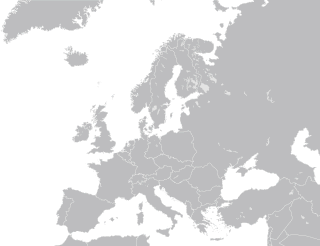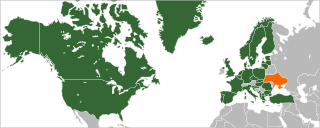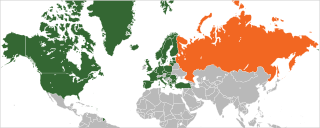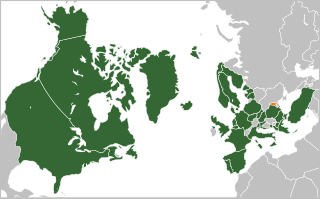Related Research Articles

The North Atlantic Treaty Organization, also called the North Atlantic Alliance, is an intergovernmental military alliance of 32 member states—30 European and 2 North American. Established in the aftermath of World War II, the organization implements the North Atlantic Treaty, signed in Washington, D.C., on 4 April 1949. NATO is a collective security system: its independent member states agree to defend each other against attacks by third parties. During the Cold War, NATO operated as a check on the threat posed by the Soviet Union. The alliance remained in place after the dissolution of the Soviet Union and the Warsaw Pact, and has been involved in military operations in the Balkans, the Middle East, South Asia and Africa. The organization's motto is animus in consulendo liber. The organization's strategic concepts include deterrence.

The foreign relations of the Russian Federation is the policy arm of the government of Russia which guides its interactions with other nations, their citizens, and foreign organizations. This article covers the foreign policy of the Russian Federation since the dissolution of the Soviet Union in late 1991. At present, Russia has no diplomatic relations with Ukraine due to its ongoing invasion of Ukraine. Other than Ukraine, Russia also has no diplomatic relations with Georgia, Bhutan, Federated States of Micronesia or Solomon Islands.

The Euro-Atlantic Partnership Council (EAPC) is a post–Cold War, North Atlantic Treaty Organization (NATO) institution. The EAPC is a multilateral forum created to improve relations between NATO and non-NATO countries in Europe and Central Asia. States meet to cooperate and discuss political and security issues. It was formed on 29 May 1997 at a Ministers’ meeting held in Sintra, Portugal, as the successor to the North Atlantic Cooperation Council (NACC), which was created in 1991.
The Atlantic Council is an American think tank in the field of international affairs, favoring Atlanticism, founded in 1961. It manages sixteen regional centers and functional programs related to international security and global economic prosperity. It is headquartered in Washington, D.C. It is a member of the Atlantic Treaty Association.

The Group of Seven (G7) is an intergovernmental political and economic forum consisting of Canada, France, Germany, Italy, Japan, the United Kingdom and the United States; additionally, the European Union (EU) is a "non-enumerated member". It is organized around shared values of pluralism, liberal democracy, and representative government. G7 members are the major IMF advanced economies.

The NATO Parliamentary Assembly serves as the consultative interparliamentary organisation for the North Atlantic Treaty Organization. Its current President is Michał Szczerba from Poland, elected in 2023. Its current Secretary General is Ruxandra Popa, who has been in this position since January 2020.

Russia and the United States maintain one of the most important, critical and strategic foreign relations in the world. Both nations have shared interests in nuclear safety and security, nonproliferation, counterterrorism, and space exploration. Due to the Russian invasion of Ukraine, relations became very tense after the United States imposed sanctions against Russia. Russia placed the United States on a list of "unfriendly countries", along with Taiwan, South Korea, Japan, Singapore, European Union members, NATO members, Australia, New Zealand, Switzerland, Micronesia and Ukraine.

The 2002 Rome summit was an exceptional NATO summit of NATO and Russia at the level of Heads of State and Government. NATO Allies and the Russian Federation created the NATO-Russia Council (NRC), which replaced the NATO–Russia Permanent Joint Council (PJC), established in 1997 as part of the Founding Act of Mutual Relations, Cooperation, and Security.

A NATO summit is a summit meeting that is regarded as a periodic opportunity for heads of state and heads of government of NATO member countries to evaluate and provide strategic direction for Alliance activities.

Georgia and the North Atlantic Treaty Organization (NATO) enjoy cordial relations. Georgia is not currently a member of NATO, but has been promised by NATO to be admitted in the future.

NATO is a military alliance of thirty-two European and North American countries that constitutes a system of collective defense. The process of joining the alliance is governed by Article 10 of the North Atlantic Treaty, which allows for the invitation of "other European States" only and by subsequent agreements. Countries wishing to join must meet certain requirements and complete a multi-step process involving political dialog and military integration. The accession process is overseen by the North Atlantic Council, NATO's governing body. NATO was formed in 1949 with twelve founding members and has added new members ten times. The first additions were Greece and Turkey in 1952. In May 1955, West Germany joined NATO, which was one of the conditions agreed to as part of the end of the country's occupation by France, the United Kingdom, and the United States, prompting the Soviet Union to form its own collective security alliance later that month. Following the end of the Franco regime, newly democratic Spain chose to join NATO in 1982.

Relations between Ukraine and the North Atlantic Treaty Organization (NATO) started in 1991 following Ukraine's independence after the dissolution of the Soviet Union. Ukraine first joined NATO's Partnership for Peace program in 1994, later joining the Planning and Review Process in 1997 and the NATO-Ukraine Commission in 1998. Although Ukraine initially declared neutrality and non-alignment with military blocs after independence, it later signaled interest in eventual NATO membership. After Russia's annexation of Crimea and support for separatist forces in eastern Ukraine in 2014, Ukraine began actively pursuing NATO membership, formally declaring it a strategic policy objective in 2017.

France–Kosovo relations are the bilateral relations between the French Republic and the Republic of Kosovo. When Kosovo declared its independence from Serbia on 17 February 2008, France became one of the first countries to announce officially about recognition of sovereign Kosovo. France has an embassy in Pristina. Kosovo has an embassy in Paris. The two countries enjoy very good and friendly relations.

Relations between the NATO military alliance and the Russian Federation were established in 1991 within the framework of the North Atlantic Cooperation Council. In 1994, Russia joined the Partnership for Peace program, and on 27 May 1997, the NATO–Russia Founding Act (NRFA) was signed at the 1997 Paris NATO Summit in France, enabling the creation of the NATO–Russia Permanent Joint Council (NRPJC). Through the early part of 2010s NATO and Russia signed several additional agreements on cooperation. The NRPJC was replaced in 2002 by the NATO–Russia Council (NRC), which was established in an effort to partner on security issues and joint projects together.
The 1974 Brussels summit was the second NATO summit bringing the leaders of member nations together at the same time. The formal sessions and informal meetings in Brussels, Belgium took place on June 26, 1974. This twenty-fifth anniversary event was only the third meeting of the NATO heads of state following the ceremonial signing of the North Atlantic Treaty on April 4, 1949.

Official relations between Moldova and NATO began in 1992 when Moldova joined the North Atlantic Cooperation Council. However, as Moldova's neutrality is enshrined in its constitution, there are no official plans for Moldova to join the organization.
The 1990 London summit was the 10th NATO summit since 1949. The ones before had been in November 1985, March 1988 and May 1989.
The 1997 Madrid summit was a meeting of the heads of state and heads of government of the sixteen members of the North Atlantic Treaty Organization (NATO) and their partner countries held in Madrid, Spain, on 8–9 July 1997. It was the 15th NATO summit and the second in 1997, the previous one being held in Paris. The summit was notable for inviting three new members, Hungary, Poland, and the Czech Republic to join the alliance.

The relationship between Azerbaijan and NATO started in 1992 when Azerbaijan joined the newly created North Atlantic Cooperation Council. Considerable partnership between NATO and Azerbaijan dates back to 1994, when the latter joined Partnership for Peace program. Azerbaijan established a diplomatic Mission to NATO in 1997 by the Presidential Decree on 21 November.

Armenia and the North Atlantic Treaty Organization (NATO) have maintained a formal relationship since 1992, when Armenia joined the North Atlantic Cooperation Council. Armenia officially established bilateral relations with NATO in 1994 when it became a member of NATO's Partnership for Peace (PfP) programme. In 2002, Armenia became an Associate Member of the NATO Parliamentary Assembly.
References
- ↑ "NATO Ministerial Meetings - Paris, 27 May 1997". www.nato.int. Retrieved 28 July 2023.
- ↑ "The NATO Russian Founding Act | Arms Control Association". www.armscontrol.org. Retrieved 28 July 2023.
- ↑ "Founding Act on Mutual Relations, Cooperation and Security between NATO and the Russian Federation". www.nato.int. Retrieved 28 July 2023.